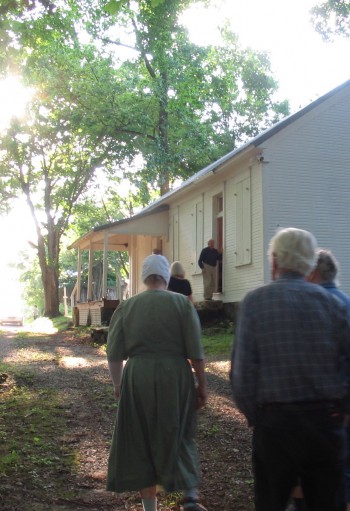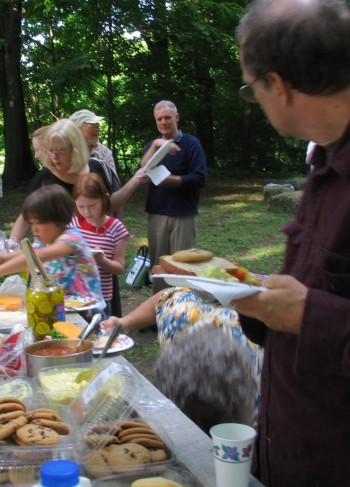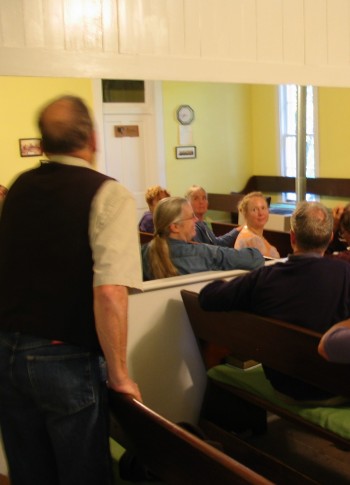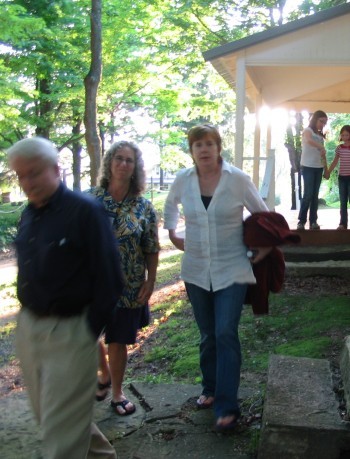 Most of us are yearning for a deeper level of connection with others. We want to be part of a people, a movement, a unity that is greater than the sum of its parts. Quite simply, we want friends. Most of us have all the co-workers, contacts and acquaintances we’ll ever need, but simple, old-fashioned friendship is in short supply.
Most of us are yearning for a deeper level of connection with others. We want to be part of a people, a movement, a unity that is greater than the sum of its parts. Quite simply, we want friends. Most of us have all the co-workers, contacts and acquaintances we’ll ever need, but simple, old-fashioned friendship is in short supply.
Take my relationship with the check-out clerk at the grocery store, for example. I wouldn’t say we’re friends. Our relationship is purely transactional. I need food, she needs me to pay for the food. Once these conditions are met, our relationship has reached its logical conclusion. I can walk out of the grocery store and never come back; it won’t have much impact on either of us. We don’t owe each other anything.
Friendship is different. As friends we come together for reasons that transcend any particular objective. We may play games, but we are not a gaming club. We may go into business together, but the success or failure of the business is not the ultimate basis of our relationship. We are friends because we care about one another at basic human level. I care for my friends as people, not merely as a means to an end. I am a friend, not because I produce any particular product or outcome, but because my love, life and identity are tied up with those around me.
 For the millions who are yearning for community, this is where we must start. Authentic community is nothing more and nothing less than a rich network of friendships. Together, we become more than than we ever could be alone. Through friendship, networks of individuals, families, tribes, and even larger groupings can find unity in a common sense of identity and purpose that goes far beyond short-term, individual self-interest.
For the millions who are yearning for community, this is where we must start. Authentic community is nothing more and nothing less than a rich network of friendships. Together, we become more than than we ever could be alone. Through friendship, networks of individuals, families, tribes, and even larger groupings can find unity in a common sense of identity and purpose that goes far beyond short-term, individual self-interest.
Friendship is magical in the way it breaks down the ordinary distinctions that separate us. Paul points to this when he writes, “There is neither Jew nor Greek, there is neither slave nor free, there is no male and female, for you are all one in Christ Jesus.” Community is friendship writ large, a set of relationships in which we remain ourselves, yet have become so much more than atomized individuals. We experience the bonds of true community when we love others as ourselves, and we discover that the other is no longer other, because they love us that way, too.
As beautiful as this vision is, it can be hard to wrap our minds around. In the ordinary world where most of us live, relationships are rarely this harmonious. We all have our own personal motivations and objectives, and when mine come into conflict with yours, watch out! Yet, genuine community can handle this kind of conflict. In fact, creative tensions and disagreements have the potential to deepen and strengthen community. Authentic friendship embraces conflict, transforming it into an acknowledged creative tension that moves us forward together.
 We should rejoice when we experience disagreement in our friendships and communities. Not only is conflict inevitable, it is the basis for all real creativity! When we are willing to openly engage with our disputes in ways that honor one another while still disagreeing, we can become something new together. Loving engagement through conflict helps us see beyond our limited, individual perspectives. We begin to discover who we are together, as a circle of friends.
We should rejoice when we experience disagreement in our friendships and communities. Not only is conflict inevitable, it is the basis for all real creativity! When we are willing to openly engage with our disputes in ways that honor one another while still disagreeing, we can become something new together. Loving engagement through conflict helps us see beyond our limited, individual perspectives. We begin to discover who we are together, as a circle of friends.
These times of open conflict can be daunting, but our stress can be greatly reduced when we keep our shared purpose in mind. Amazing depths of power await us when we remember that our mission is to serve rather than be served. We join together to create something beautiful for others, rather than to satisfy our own selfish desires or make ourselves more comfortable. As Charles Eisenstein puts it, “Joint consumption doesn’t create intimacy. Only joint creativity, and gifts, create intimacy.” True community exists whenever we choose to look beyond our present hang-ups and explore the amazing challenges God is calling us to.
 It’s time to develop the kind of selfless love that makes deep, authentic life together possible. We need bonds of loyalty that go beyond quid pro quo transactions, instead seeking to bless others. This kind of friendship breaks down the you/me, us/them distinctions that keep us separate and isolated from one another. It embraces healthy conflict as a path to unity. Rather than passively consuming together, we engage in shared creativity that makes the world a more beautiful place.
It’s time to develop the kind of selfless love that makes deep, authentic life together possible. We need bonds of loyalty that go beyond quid pro quo transactions, instead seeking to bless others. This kind of friendship breaks down the you/me, us/them distinctions that keep us separate and isolated from one another. It embraces healthy conflict as a path to unity. Rather than passively consuming together, we engage in shared creativity that makes the world a more beautiful place.
We cannot embrace these kinds of relationships and remain unchanged. When we become true friends, our lives are going to be disrupted, shifted, deepened in unpredictable ways. Being community makes us dependent on each other. Perhaps the biggest reason that so many of us have avoided this kind of connection so far is that real friendship takes us out of the driver’s seat. We don’t get to control where we’re going. Community is a collaborative adventure that leads us down startling, unforseen paths. This is the kind of friendship that Jesus invites us into, a way of living where we truly become one with each other, but at the cost of our own illusions of independence and control.
How does it make you feel to think about the unity and surrender that true friendship can bring? Excited? Nervous? Curious? What kinds of changes do you sense might be required of you to become a friend to those around you? Are there areas in your life that will need to change in order for you to be faithful?